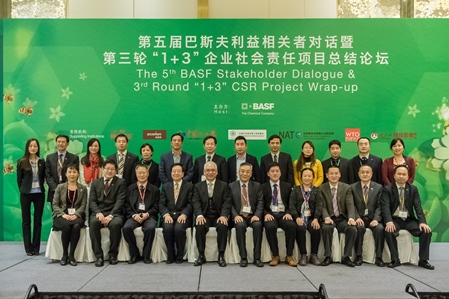
Shanghai, China– December 19, 2013 –BASF, the world’s leading chemical company, recently celebrated achievements of the “1+3” Corporate Social Responsibility (CSR) project, an initiative that brings together diverse members of the chemical supply chain to achieve common sustainability goals. For the first time, project partners participated in BASF’s annual stakeholder dialog, where they reviewed ways to improve overall sustainableperformances in environment, health and safety as well as in CSR.
Since the launch of the “1+3” CSRproject in 2006, on the platform of China Business Council for Sustainable Development (CBCSD), sustainability performance along the chemical industry value chain has seen steady improvements. Over the last six years, 27 project partners, which are suppliers, logistics providers or customers of BASF, have supported the initiative, and around 140 local and international companies in China have participated in the project.
As a result of the project, a number of project partners are making tangible improvements in their environmental, health and safety (EHS) performance, especially in the fields of environmental protection, transportation safety and emergency response. These were all achieved through investment, back-end enhancement, eco-friendly initiatives, self-assessments, and evaluations by a special task force. At the same time, BASF also contributed to help the partners to identify potential areas of improvement through its “Eyes for Safety” initiative.
For example, Yantai Tayho Advanced materials Co., Ltd., has invested over RMB3 million to upgrade its off gas treatment tower to reduce air emission. A further investment of RMB6 million will be made to reduce dust emission by installing bag-type dust collectors. Zhejiang Guanghua New Materials Co., Ltd., on the other hand, has established a Safety Steering Committee and introduced a holistic EHS management system to enhance occupational safety and environmental protection. As for Lianhe Chemical Technology Co., Ltd., it has launched an online tracking system that ensured projects are completed within a short time.
“The project is an innovative model which helps companies from the entire supply chain to implement sustainability measures. I am very encouraged to see the constant improvement and effort from the industry players in building a harmonious and sustainable society in China,” said Mr. Zhai Qi, Executive Secretary General, CBCSD. “Beyond the fruitful results in China, I am also pleased to see that the concept has been well recognized in South Korea.” In 2010, Korean Business Council of Sustainable Development (BCSD) led a delegation to visit BASF to specifically learn aboutits 1+3 project. The “Green Partnership between Large Enterprises and SMEs” initiative has been endorsed by the Korean government.
In addition to1+3 project, BASF also holds annual stakeholder dialog sessions in China including opinion leaders and industry experts, who give feedback on the company’s strategy, operations and sustainability endeavors in China. “One way we live our corporate purpose – ‘We create chemistry for a sustainable future’ – is by establishing strong relationships with stakeholders across the value chain,” said Mr. Johnny Kwan, Senior Vice President, Country Platform & Functions, Greater China, BASF.
“Over the years, we have been constantly improving our stakeholder engagement initiatives. This year for the first time, the ‘1+3’ CSR project partners were engaged in the dialog, which comprised a wider range of stakeholders including customers, service providers, suppliers, government officials, media, scholars, academia and non-governmental organizations. This enhances even higher degree of transparency in driving a sustainable chemical industry in China,” continued Mr. Kwan.
- CBCSD and Members Participated and Suggested on the Project for Technical Regulation on Low-carbon Pilot Community
- CBCSD and Members Participated in the APEC Cooperation Network Construction Forum of Green Supply Chain
- Calculation Method of CO2 Emissions in Petroleum and Natural Gas Exploitation Enterprises & Calculation Method of CO2 Emissions in Water Network of Chemical Enterprises
- CBCSD Attended the Workshop for Environmental Protection and Sustainable Development and Delivered Introductions
- WBCSD: Tackling the Challenge, How to Make Informed Choices on Forest Product?
- The National New-Type Urbanization Plan Released, Board Members of CBCSD Help the Sustainable Development of Cities
- Board members of CBCSD Actively Participated in the Carbon Trading and International Climate Change Process
- Two industrial Standards Compiled by CBCSD Passed Examination
- Widespread Use of the Achievements Businesses Energy Saving and Greenhouse Gas Management
- CBCSD held Chemical industry enterprise value chain (range 3) greenhouse gas emissions, accounting and reporting guidelines

